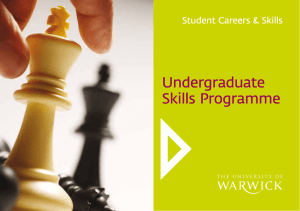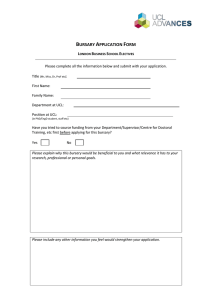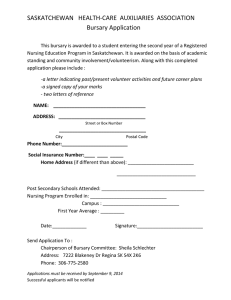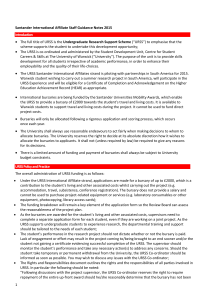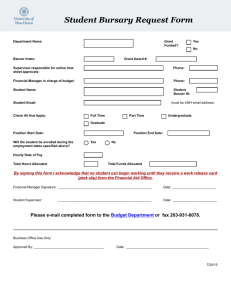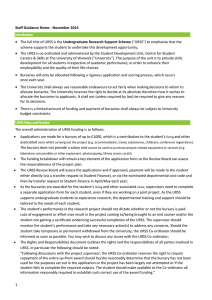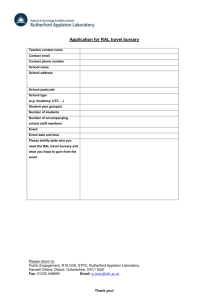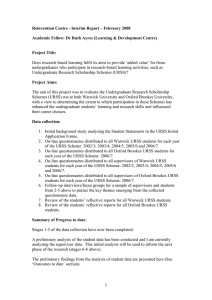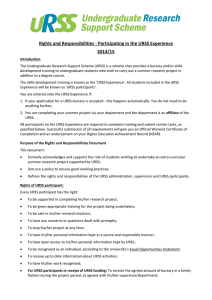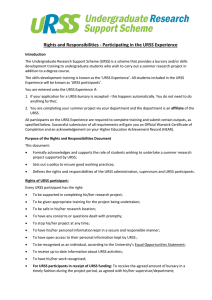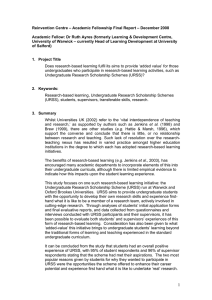Student Guidance Notes
advertisement
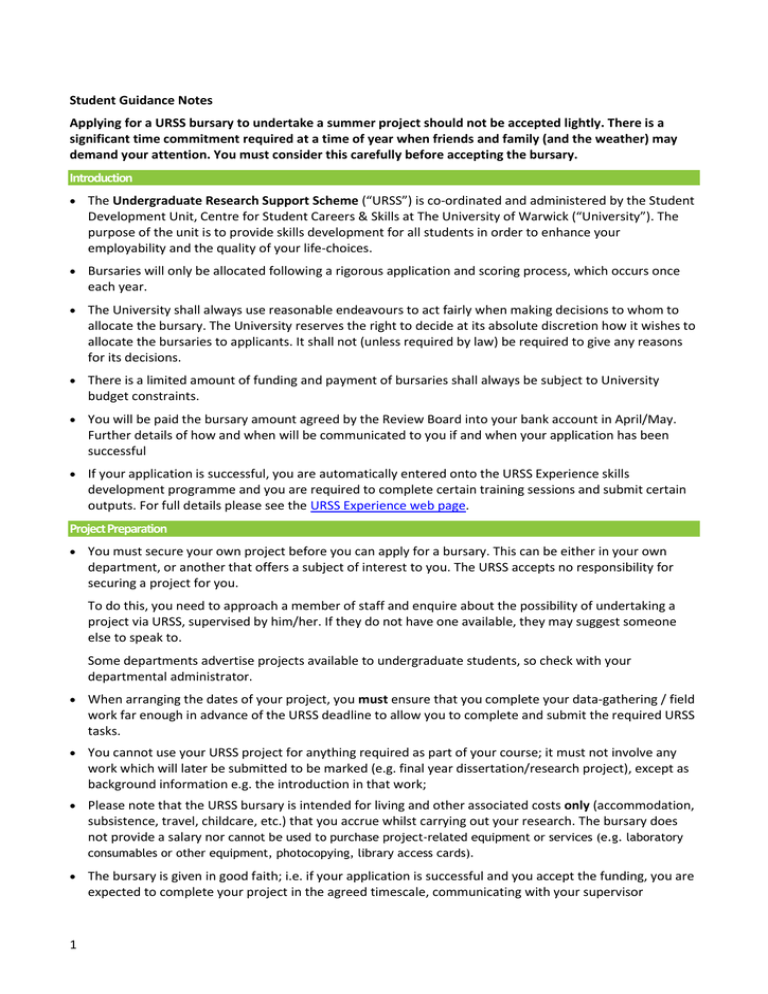
Student Guidance Notes Applying for a URSS bursary to undertake a summer project should not be accepted lightly. There is a significant time commitment required at a time of year when friends and family (and the weather) may demand your attention. You must consider this carefully before accepting the bursary. Introduction The Undergraduate Research Support Scheme (“URSS”) is co-ordinated and administered by the Student Development Unit, Centre for Student Careers & Skills at The University of Warwick (“University”). The purpose of the unit is to provide skills development for all students in order to enhance your employability and the quality of your life-choices. Bursaries will only be allocated following a rigorous application and scoring process, which occurs once each year. The University shall always use reasonable endeavours to act fairly when making decisions to whom to allocate the bursary. The University reserves the right to decide at its absolute discretion how it wishes to allocate the bursaries to applicants. It shall not (unless required by law) be required to give any reasons for its decisions. There is a limited amount of funding and payment of bursaries shall always be subject to University budget constraints. You will be paid the bursary amount agreed by the Review Board into your bank account in April/May. Further details of how and when will be communicated to you if and when your application has been successful If your application is successful, you are automatically entered onto the URSS Experience skills development programme and you are required to complete certain training sessions and submit certain outputs. For full details please see the URSS Experience web page. Project Preparation You must secure your own project before you can apply for a bursary. This can be either in your own department, or another that offers a subject of interest to you. The URSS accepts no responsibility for securing a project for you. To do this, you need to approach a member of staff and enquire about the possibility of undertaking a project via URSS, supervised by him/her. If they do not have one available, they may suggest someone else to speak to. Some departments advertise projects available to undergraduate students, so check with your departmental administrator. When arranging the dates of your project, you must ensure that you complete your data-gathering / field work far enough in advance of the URSS deadline to allow you to complete and submit the required URSS tasks. You cannot use your URSS project for anything required as part of your course; it must not involve any work which will later be submitted to be marked (e.g. final year dissertation/research project), except as background information e.g. the introduction in that work; Please note that the URSS bursary is intended for living and other associated costs only (accommodation, subsistence, travel, childcare, etc.) that you accrue whilst carrying out your research. The bursary does not provide a salary nor cannot be used to purchase project-related equipment or services (e.g. laboratory consumables or other equipment, photocopying, library access cards). The bursary is given in good faith; i.e. if your application is successful and you accept the funding, you are expected to complete your project in the agreed timescale, communicating with your supervisor 1 regularly, as expected in a professional position. You are also expected to submit the required outputs to URSS and/or the department on or by the deadline given. Following discussions with the project supervisor, the URSS Co-ordinator reserves the right to require repayment of the entire up-front award should he/she reasonably determine that the bursary has not been used for the purposes set out in the application or the project has been largely not attempted or if you fail to complete the required outputs. You should make available to the Co-ordinator all information reasonably required to establish such correct use of the award funding. Who is Eligible for URSS Funding? If you are a fully-registered Warwick undergraduate student, then you are eligible to apply for a URSS bursary. This excludes visiting Erasmus students, students visiting via other exchange or internships programmes as part of your degree course (i.e. not extra curricular). However, Warwick students abroad on an Erasmus exchange are eligible (if you are unsure what your status please contact Student Records) For international students subject to immigration control (Tier 4 visa), you need to consider how many hours you are allowed to work outside of your course before applying for a URSS bursary: Tier 4 visas for non-finalists: If you have a Tier 4 visa which was issued for a degree level course or above, you are allowed to work no more than 20 hours per week during term time and full time during vacations. It is your responsibility to adhere to your visa requirements, so please discuss this with your supervisor when submitting your application. Tier 4 visas for finalists: Under a Tier 4 visa, you should only be working up to a maximum of 20 hours per week until the end date that appeared on your CAS. Once the end date on your CAS has passed, you are allowed to work full-time but cannot fill a permanent vacancy. For further information see the International Office: Working in the UK web pages. As a finalist, you are most welcome to apply for a URSS bursary, however you will probably be completing some or all of your research project after your graduation, when you will no longer be classed as a full member of the University. This can add additional complications, in particular for IT, Library and building access and although the URSS Team tries to minimise the impact that this has on your URSS experience, this is not always possible. You can apply for URSS funding in successive years, whether your application was successful or not. However, you will be asked to detail what more you will gain from undertaking another project and what additional skills and experience you will develop. This will be taken into account by the Reviewers. Completing the Student Application Form This form is to be completed in conjunction with a separate but parallel one from the lead academic supervisor of your project, as for technical reasons, the application form cannot be completed jointly. You can only make one application per year. You are unable to go back and edit/make changes to the form; this means the content should be decided and agreed by both parties before submitting the online application. Any major discrepancies between the forms may count against the application. The URSS administration will NOT follow up on incomplete applications (e.g. where one half of the full application is missing). Please therefore ensure you complete this in full communication with your prospective supervisor. 2 The form comprises a number of mandatory questions including some that collect data for recording and monitoring, as well as some that will be evaluated against the selection criteria (see below) to ensure the process is fair and transparent. The process will be highly competitive. Alternative email address: we need you to provide an alternative email address in case you are unable to access your Warwick one for some reason. This will only be used for URSS purposes, or for contacting you about further dissemination opportunities after the year’s Scheme is complete. Visa status: details of visa status and year: We collect these details for recording purposes only. They are not divulged to the reviewers and do not affect your application in any way. As mentioned previously, if you are planning to complete your project in the summer vacation in which you graduate, there can be problems accessing building and IT services. In order to minimise this, we ask you to alert us, so that we can attempt to make arrangements to mitigate these issues. Giving your year will also allow the URSS to identify the preferred point at which you undertake a URSS project and allow us to develop the scheme appropriately in future. In addition, should we need to contact you after your project, we should be able to ascertain the correct email address to use. Your project title needs to be EXACTLY the same on both your and your supervisor’s application forms. If it is not, the forms may not be linked together and may not be scored. To show that you understand the project you need to give a brief outline of what you plan to research. This should be in your own words (not copied from your supervisor’s application), although your supervisor should offer advice and guidance. Knowing what benefits and applications your project may have is an important aspect of disseminating research. This may be to the local community, to the wider world, or to the knowledge base of that particular subject (knowledge for knowledge sake). Each is equally valuable, you just need to show you can share it effectively. The project must have a full member of Warwick academic staff as lead supervisor. If someone else is actually supervising your project on a day-to-day basis (e.g. clinician in hospital, post doc, PhD student, member of an external organisation), these should be detailed in the ‘additional supervisor’ section. Please check the spelling of all names before you submit your form. You do not need to include the person’s title (Dr, Prof, Mr, Mrs etc.) If you are planning to travel abroad as part of your project, the URSS needs to know, as we take the wellbeing of our students very seriously. This information will also be shared with the Student Support team, who handle calls that you or your family make to the University, particularly out of hours, and will liaise with the URSS Co-ordinator as necessary. Warwick has international partnership priorities with some South American countries, so the URSS and the International Office would like to know if you will be travelling to these countries to carry out your research. International Affiliate Pilot 2015: certain projects are participating in an exchange with institutions in Brazil and Colombia for the first time in 2015. These projects have already been finalised, so if you are not already aware of this initiative, then your project is not eligible this year and you should NOT check the box. The University holds travel insurance which does cover staff and students travelling on University Business. Indication that you will be travelling abroad will also be passed to the University Insurance Office. Please see the web page for full details and contact the department to ensure that you are covered. 3 Undergraduate projects do regularly involve areas that require ethics consideration and/or approval. The URSS works closely with the University’s Research Ethics Committees (RECs) and will pass on details of projects which indicate that ethics considerations are present. Your supervisor should advise and guide you in this area, but the RECs welcome any enquiries from you directly. Please see the REC’s web page for further information. Along with your outline of your project and your explanation of the potential benefits, the supporting information (questions 1-5) are the primary areas assessed by the reviewers against the impact section of the assessment criteria (see below). You should evidence that you have thought about how participating in the project will impact on you and your future plans (further study, employability, career choices). It should include the skills (both research-specific and transferrable) and qualities (e.g. confidence) that you wish to develop. Remember that transferable skills are as valuable as research-specific ones. Please ensure this section is detailed but succinct. A good application will contain information that is clear, realistic and appropriate and shows evidence of being well-thought out. As mentioned previously, you are welcome to apply for URSS funding in successive years. But you must give clear and well-thought through evidence of what more you will gain from doing another URSS project. This will be taken into account by the reviewers. If you wish to carry out a project via URSS but do not need a bursary you are welcome to do so, BUT you will still need to research and submit an indicative breakdown of your living costs (up to £1000), as if you were applying for a bursary. You should title this section ‘Indicative breakdown’ and put 0 in the section asking how much you are applying for. You need to look into the costs you think you will incur (up to a maximum of £1000) and create a realistic and thorough funding breakdown. It will remain a key element of the application form so the Review Board can assess the reasonableness of the project plan in relation to your suggested timescale. You need to summarise it and share it with your supervisor to ensure you have both agreed on the purposes of the funding. You will have your own specific needs regarding these living costs. However, at the most basic level, the following information may help you when working out your funding breakdown. On campus accommodation (summer & Christmas 2014 – may change summer 2015): £13 - £20 per night = £91-£140 per week Subsistence (food) suggested spend, based on self-catering all meals): £25-35 per week Travel: based on regional daysaver: 5 ticket scratch card = £19 Total per week- £135 - £194 You can apply for bursary of £1000 maximum. You therefore need to consider how this will support your entire living costs. E.g. £1000 over 10 weeks = £100 per week - campus accommodation costs £91 per week minimum, leaving £9 per week. To ensure you can buy food & pay travel costs, you may need to reduce the length of your project. A bursary will NOT be granted to pay for direct project costs, so mention of these should not be included. The amount requested does not affect the decision to award a bursary. If the amount given is different to the supervisor application form, the amount you state will be the one used. 4 If the application is successful, the bursary amount will be transferred to you in April/May. Further details will be given to you if your application is successful. You must be able to agree to all of the terms & conditions of Application, otherwise you are ineligible to apply. You need to read the URSS Rights and Responsibilities and tick that you agree to adhere to them if your application is successful. When you submit your completed application, you will receive an automated response and copy of your submission to say the application has been submitted successfully. If you DO NOT receive this email immediately, please contact URSS@warwick.ac.uk to verify your submission. This receipt will be taken as proof of application in case of query, so please retain for future reference. Reviewing Applications All applications go through a Review Board decision process in February/March, after the closing date. The bursary application is scored on three areas of assessment criteria: Impact: refers to the level of impact participating in the project will have on you and your future plans (study, employability, career choices). Quality: is about the project itself (i.e. the nature of the research), how it fits into departmental research and the ways in which you will be supported in developing any required skills. This is detailed in the staff application form. Value for money: requires an accurate and well researched, breakdown of projected living and associated costs that you will need to pay in conducting your research. It should include ALL living and associated costs, particularly if the total reaches more than £1000. A good application will contain information that is clear, realistic and appropriate. It should show evidence of being well-thought out and personalised. You should expect to hear the outcome by the end of the spring term. The URSS will not return your application and nor will it provide individual feedback on applications. 5
